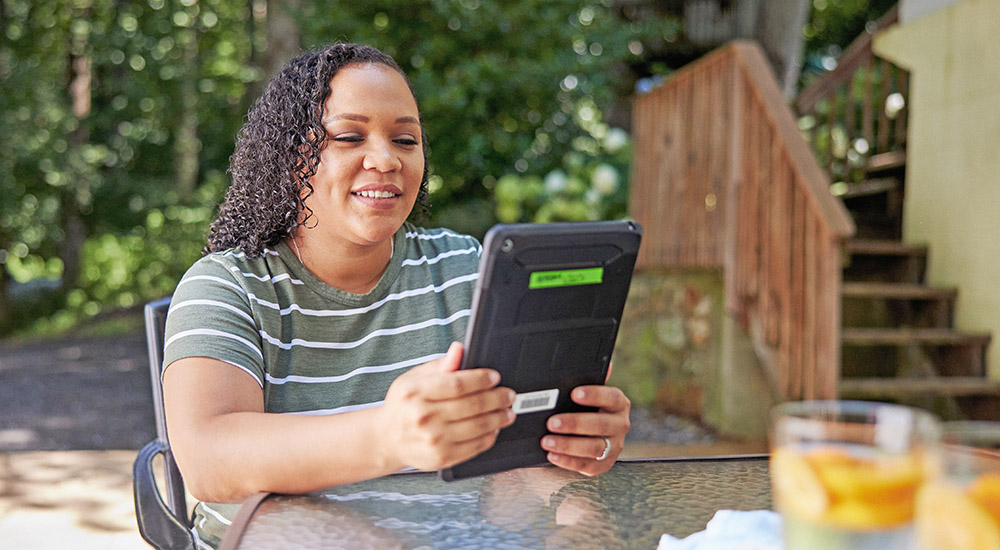VA’s Clinical Resource Hubs (CRH) is a national program delivering innovative telehealth technologies and resources to improve access to care and close gaps in services. The program has adopted a “cross-catchment” approach to ensure that, whether a Veteran resides in Utah, Montana, or Oklahoma (for example), high-quality, specialized care is readily accessible.
VA’s Rocky Mountain Network is no stranger to making access to health care a top priority. The network is the largest in the country. Spanning 10 different states, it covers over 500,000 square miles and provides care to an estimated 1 million+ Veterans.
Many in this geographic area face challenges accessing care due to location (thank you, beautiful Rocky Mountains), extreme winter weather, and simply put – distance.
“I do think telehealth is becoming much more accepted and people are getting comfortable with it,” said Dr. Lavina Sanders, a CRH Telemental Health Team lead. “They’re realizing, ‘You know what? I can get all the same care and not even have to leave my house.’ That’s huge.”
Access for groups with limited options
The network’s CRH program is working across catchment areas (geographic areas of care defined by an institution) to bring together Veterans with unique needs and improve access for groups that historically have had limited options available within their communities. It is removing barriers to peer support which has benefits that other professional relationships do not.
The Orientation to Well-Being group, led by clinicians using strategies from Focused Acceptance & Commitment Therapy (FACT), help Veterans build skills to help change their relationship with unwanted inner experiences (thoughts/emotions). It helps them better connect their personal values with behavior changes that are consistent with those values.
“Veterans have consistently said that the cross-catchment nature of the group allows them to connect with other Veterans across their region, enabling a strong sense of connection around shared experiences”, said Dr. Julie Ross, psychologist, and Cara McClain, psychology doctoral intern, co-facilitators on the VISN 19 Primary Care-Mental Health Integration (PCMHI) team. “Veterans express that the group provides them with a safe space to be vulnerable, normalizes their struggles and teaches them valuable skills for finding ways to move in the direction of their values.”
Clinical resource hubs a safe space for groups
Shilpa Trivedi, a clinical social worker leading the TelePRIDE group (PRIDE in All Who Served for LGBTQ+ Veterans), has witnessed the value of this connection time and time again.
“One group had all transgender women and they loved it. At least a few were coming from remote areas and hadn’t gotten to connect with other women who were transitioning. Another group ended up being all gay men from multicultural backgrounds and different service areas. They got to talk about finding acceptance as gay men of color in different types of geographic locations and on being gay in the military in the Vietnam Era, under Don’t Ask, Don’t Tell. The Veterans are getting a lot of positive feedback and this has led to the implementation of more TelePRIDE cross-catchment groups.”
Treatment support for a wide variety of conditions
Orientation to Well-Being and TelePRIDE are just two of the many cross-catchment groups making differences in the lives of Veterans through the V19 CRH.
Groups are also offered to support treatment for chronic pain, insomnia, posttraumatic stress disorder (PTSD), grief, anxiety, depression, isolation, tobacco cessation, nightmares and more.
CRH’s cross-catchment groups increase Veterans’ access to support in a region where location has historically made it difficult to make connections with others that have similar values and shared experiences.
If you are a Veteran receiving care through the Rocky Mountain Network and would like to learn more about these support groups, contact your Primary Care Provider.
Topics in this story
Link Disclaimer
This page includes links to other websites outside our control and jurisdiction. VA is not responsible for the privacy practices or the content of non-VA Web sites. We encourage you to review the privacy policy or terms and conditions of those sites to fully understand what information is collected and how it is used.
More Stories
Bob Jesse Award celebrates the achievements of a VA employee and a team or department that exemplifies innovative practices within VA.
The Medical Foster Home program offers Veterans an alternative to nursing homes.
Watch the Under Secretary for Health and a panel of experts discuss VA Health Connect tele-emergency care.







Please resume the in person Vietnam Veterans PTSD group meetings at the Danville, il VA PTSD clinic.
They were wisely stoped when Covid hit. Now it’s been 2 years plus and Covid is no longer the issue it once was.
Vietnam veterans are now getting up in age and won’t be around much longer. We need the group meetings in person and not online. We grew up in an age where there were no computers and online meetings aren’t the same as face to face meetings for us.
Please help.
Thanks so much. Randy Waskowiak
How do you find a care facility in rural areas where you live about 50 miles from the closest VA clinic or hospital
How about getting tablets to disabled veterans. Then send them someone to train them to use it. For medical and group meetings.